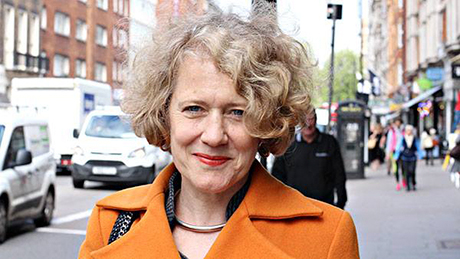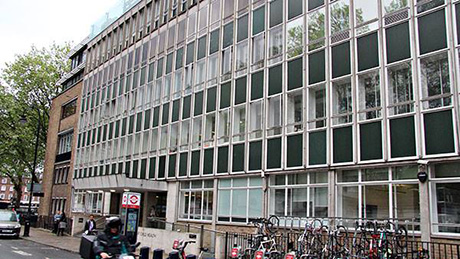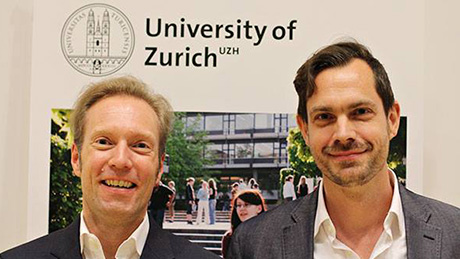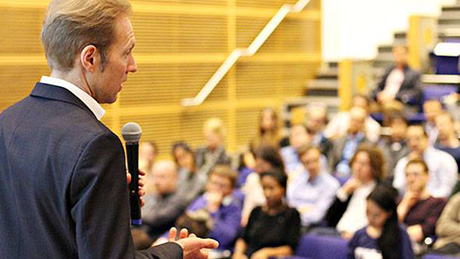Navigation auf uzh.ch
Navigation auf uzh.ch
9am
The Zurich delegation meets in the hotel lobby. This morning’s program for the representatives of the City and Canton of Zurich revolves around the Financial Innovation Initiative. It includes a visit to the Canary Wharf financial district to meet people in financial services and politics to discuss fintech and the evolution of the financial industry going forward with digitalization. One of those present is UZH IT professor Abraham Bernstein. He is one of the initiators of the UZH Swiss FinTech Innovation Lab.
In an interview in the hotel lobby I ask UZH President Michael Hengartner about the significance of collaboration with London universities for the University of Zurich, and what has impressed him most about Zürich meets London so far. His responses can be seen in the video.
10am
Michael Hengartner visits his counterpart at University College London, UCL President and Provost Michael Arthur. They talk about other fields of potential cooperation, for example biomedicine and research into the digital society. The people at UCL are also interested in hearing about Switzerland’s experiences in the wake of the yes vote to the mass immigration initiative – hardly a surprise given that the Brexit referendum is due to take place in only a few weeks, on 23 June.
Many British scientists view the prospect of the UK’s leaving the EU with trepidation. What would the implications for universities be? The Scientists for EU group fears that Brexit would jeopardize UK involvement in EU research programs, and make it harder for researchers to move around. Not surprisingly, the Scientists for Britain group sees things differently. Interestingly, both sides make repeated reference to Switzerland’s experience. A survey published in March in the journal Nature shows that a clear majority (83%) of the British research community is against the UK’s leaving the EU.

2pm
From “Switzerland meets the UK” to “Zürich meets London”: I receive an e-mail from Zurich’s mayor Corine Mauch with answers to questions I sent her.
What’s the significance of London for Zurich? Why does networking make sense? Corine Mauch: In many ways Zurich and London are comparable, and face similar challenges. They’re cities that perform important central functions: prestigious universities, centers of culture with an impact way beyond their borders, and economic centers with strong financial services and emerging creative industries. Urban development, residential policy, and growth issues occupy us in Zurich as much as they do our counterparts in London. Networking is a chance to talk and share ideas and approaches about how to tackle these challenges.
What issues are particularly interesting for you in terms of the dialogue with London?
Corine Mauch: Basically it revolves around innovation. From fintech and ICT to science, urban development, and the arts, the question is always about how to deal with change, and how to keep reinventing ourselves. Our dialogue with London is a source of new ideas about how cities can act as centers of innovation. Hearing other points of view offers new ways of looking at this issue.
What for you is the significance of the University of Zurich’s involvement in Zürich meets London?
Corine Mauch: Collaboration with the University of Zurich is key to this project. The quality of Zurich’s showing in London is thanks to a significant extent to UZH. At the same time, the University’s international engagement boosts Zurich’s status in the world of education and means we’re increasingly seen as a center of knowledge and learning.

4pm
Today’s scientific events at Zürich meets London are devoted to neuroscience. When you look at the list of partnerships between UZH and London universities that hardly comes as a surprise. One highlight is the cooperation between the University of Zurich and University College London (UCL). Between 2012 and 2015, members of UZH have produced around 500 co-publications with researchers at UCL. Today I’m going to find out more about two examples of this collaboration.
First I attend a workshop on Advances in Computational Neuroimaging organized by UZH psychiatrist Dominik Bach together with UCL neuropsychiatrist Raymond J. Dolan. It looks at the question of how in neuroscience imaging can be evaluated effectively using mathematical models. Dominik Bach and other researchers at UZH are collaborating with the Wellcome Trust Centre for Neuroimaging and the Max Planck UCL Centre for Computational Psychiatry and Ageing Research – both affiliated with UCL.

Dominik Bach is an interesting example of how cooperation between universities can come about. He spent three years as a postdoc at UCL. Now he’s both a professor at UZH and an honorary research fellow at the Wellcome Trust Centre for Neuroimaging. “I’m by no means the only person from UZH with experience in both places. We have a number of researchers in Zurich who previously worked at UCL. By the same token, neuroscientists often switch from Zurich to London. If you have this experience it’s obvious that you’re going be open to further collaboration in the future.” It’s no accident that UCL has become such an important partner for UZH. “London’s one of the best centers of neuroscience in the world,” says Bach.

6pm
Klaas Enno Stephan is one of the pioneers in terms of collaboration between UZH and UCL. He is a professor at the Institute of Biomedical Engineering, UZH/ETH, where he heads the Translational Neuromodeling Unit (TNU). In London he’s giving a public lecture at the UCL Institute of Child Health on Novel Approaches to Understanding the Mechanisms of Mental Health and Illness.
In a lively presentation he talks about ways of using mathematical models to enable more accurate psychiatric diagnosis and more effective treatment. By way of illustration he points to schizophrenia, which covers symptoms with a whole range of underlying neural mechanisms. Mathematical models may help us understand the associated patterns of brain activity. These models are being used in an attempt to predict whether a patient will respond to specific drug treatment. The research group of Klaas Enno Stephan has just initiated a corresponding study. From his talk it’s apparent that the work so far has been thanks in large part to collaboration between Zurich and UCL.